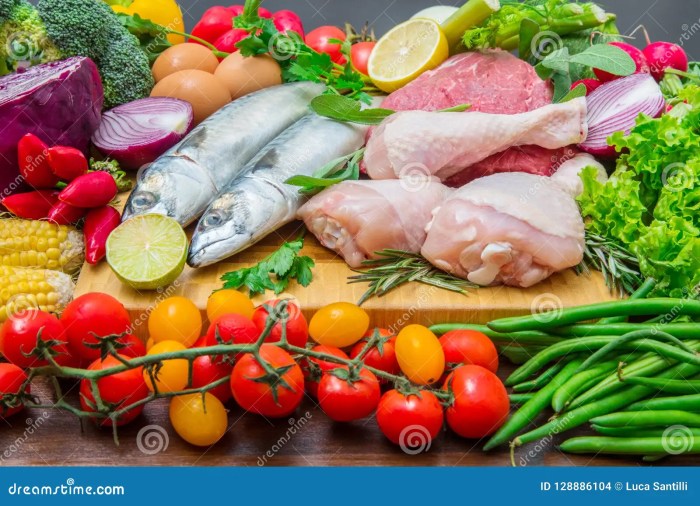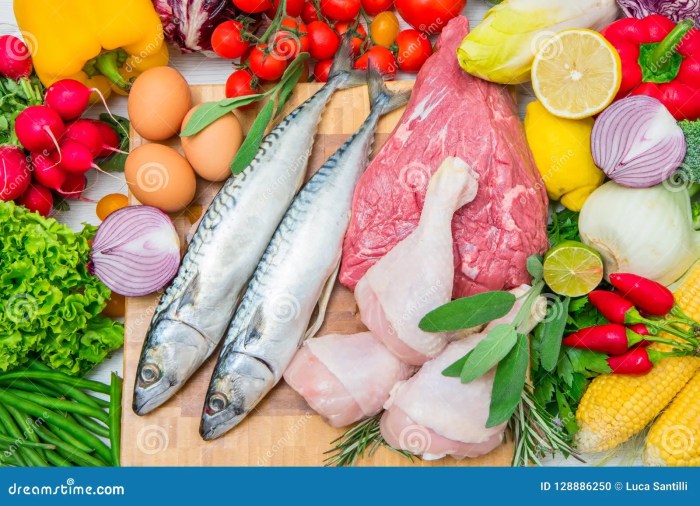Meat vegetable diet: Dive into the depths of a comprehensive analysis of meat-based and plant-based diets, exploring their nutritional values, health implications, environmental impact, ethical considerations, practical aspects, and cultural influences. Get ready to make informed choices that align with your health, values, and the planet.
This guide will provide you with a clear understanding of the nutritional composition of both diets, their potential impact on your health, and the ethical and environmental implications associated with each choice. We’ll also delve into the practicalities of adopting a meat-based or vegetable-based diet, including meal planning, recipe ideas, and tips for overcoming challenges.
Nutritional Value of Meat and Vegetable Diets
Meat-based and vegetable-based diets offer distinct nutritional profiles, each with its own advantages and potential drawbacks. Understanding the nutritional composition of these diets is crucial for making informed dietary choices that support optimal health.
Meat-based diets provide a rich source of high-quality protein, essential for building and repairing tissues. Meat is also a good source of iron, vitamin B12, and zinc, which are vital for red blood cell production, cognitive function, and immune health.
However, meat-based diets can be higher in saturated fat and cholesterol, which may increase the risk of cardiovascular disease if consumed in excess.
Vegetable-based diets, on the other hand, are rich in fiber, vitamins, minerals, and antioxidants. Fiber promotes satiety, regulates blood sugar levels, and supports digestive health. Vegetables provide a wide range of vitamins and minerals, including vitamin C, potassium, and folate, which are essential for immune function, blood pressure regulation, and cell growth.
However, vegetable-based diets may be lower in certain nutrients, such as protein, iron, and vitamin B12, which can lead to deficiencies if not supplemented or obtained from fortified foods.
Essential Nutrients in Meat-Based Diets
- Protein: Essential for building and repairing tissues, enzymes, and hormones.
- Iron: Vital for red blood cell production and oxygen transport.
- Vitamin B12: Essential for cognitive function, red blood cell production, and DNA synthesis.
- Zinc: Important for immune function, wound healing, and cell growth.
Essential Nutrients in Vegetable-Based Diets
- Fiber: Promotes satiety, regulates blood sugar levels, and supports digestive health.
- Vitamin C: Essential for immune function, collagen production, and antioxidant protection.
- Potassium: Important for blood pressure regulation, muscle function, and electrolyte balance.
- Folate: Vital for cell growth, DNA synthesis, and red blood cell production.
Potential Nutritional Deficiencies
Meat-based diets may be deficient in fiber, which can lead to constipation and other digestive issues. They may also be lower in certain vitamins and minerals, such as vitamin C, potassium, and folate, if fruits and vegetables are not consumed in sufficient quantities.
Vegetable-based diets may be deficient in protein, iron, and vitamin B12. Protein deficiency can lead to muscle loss, weakness, and impaired immune function. Iron deficiency can cause anemia, fatigue, and shortness of breath. Vitamin B12 deficiency can lead to neurological problems, cognitive impairment, and anemia.
If you’re considering adopting a vegetarian diet, it’s crucial to plan a balanced and nutritious menu to ensure you meet all your nutritional needs. A comprehensive vegetarian diet list can provide guidance on which foods to include and exclude, helping you create a healthy and sustainable eating plan that supports your well-being.
Mitigating Nutritional Deficiencies
To mitigate potential nutritional deficiencies, it is important to consume a balanced diet that includes a variety of foods from all food groups. Vegetarians and vegans may need to supplement with certain nutrients, such as vitamin B12 and iron, to ensure adequate intake.
Fortified foods, such as plant-based milk and cereals, can also help to provide essential nutrients.
Health Implications of Meat and Vegetable Diets

The consumption of meat and vegetables has significant implications for human health. Studies have established associations between meat consumption and the development of chronic diseases, while vegetable-based diets have been linked to numerous health benefits.
Meat Consumption and Chronic Diseases
Research has demonstrated that excessive meat consumption, particularly red and processed meats, increases the risk of cardiovascular disease. The high levels of saturated fat and cholesterol in these meats contribute to the formation of plaques in blood vessels, leading to atherosclerosis and an increased risk of heart attacks and strokes.
Moreover, meat consumption has been associated with an increased risk of type 2 diabetes. The high protein content in meat can impair insulin sensitivity, making it difficult for the body to regulate blood sugar levels.
Additionally, some studies suggest that meat consumption may be linked to certain types of cancer, such as colorectal and prostate cancer. The heme iron and heterocyclic amines produced during the cooking of meat have been implicated in the development of these cancers.
Health Benefits of Vegetable-Based Diets
In contrast to meat-based diets, vegetable-based diets have been associated with numerous health benefits. Vegetables are rich in fiber, vitamins, minerals, and antioxidants, which play a crucial role in maintaining overall health.
Vegetable-based diets have been shown to reduce the risk of chronic diseases, including cardiovascular disease, type 2 diabetes, and certain types of cancer. The fiber in vegetables helps lower cholesterol levels and improve insulin sensitivity, while the antioxidants protect cells from damage.
Additionally, vegetable-based diets have been linked to improved weight management and increased longevity. The high fiber content in vegetables promotes satiety, reducing overall calorie intake. The antioxidants in vegetables also help protect against age-related diseases, contributing to a longer and healthier life.
Overall Health Implications and Recommendations
The overall health implications of meat-based and vegetable-based diets are clear. Meat-based diets have been associated with an increased risk of chronic diseases, while vegetable-based diets offer numerous health benefits.
Based on the available evidence, it is recommended to limit the consumption of red and processed meats and increase the intake of fruits, vegetables, and whole grains. A balanced diet that emphasizes plant-based foods can help reduce the risk of chronic diseases, improve weight management, and promote overall health and longevity.
Environmental Impact of Meat and Vegetable Diets
The food choices we make have a significant impact on the environment. Meat production, in particular, has been linked to a range of environmental issues, including greenhouse gas emissions, water consumption, and deforestation. Vegetable-based diets, on the other hand, offer numerous environmental benefits, such as a reduced carbon footprint, water conservation, and land preservation.
Greenhouse Gas Emissions
Meat production is a major contributor to greenhouse gas emissions. Livestock, particularly cattle, produce methane, a potent greenhouse gas, as part of their digestive process. Additionally, the clearing of forests for grazing land and the production of feed crops further contribute to carbon emissions.
Water Consumption
Meat production requires significant amounts of water. It takes approximately 1,800 gallons of water to produce one pound of beef, compared to just 23 gallons of water for a pound of vegetables. This water consumption puts a strain on water resources, especially in regions where water is scarce.
Deforestation
The demand for meat has led to widespread deforestation, as forests are cleared for grazing land and to grow feed crops. Deforestation not only destroys valuable ecosystems but also contributes to climate change by reducing the Earth’s capacity to absorb carbon dioxide.
Environmental Benefits of Vegetable-Based Diets
In contrast to meat-based diets, vegetable-based diets offer numerous environmental benefits. Plant-based foods have a much lower carbon footprint, as they require less land, water, and energy to produce. Additionally, vegetable-based diets promote water conservation and help preserve forests.
Comparison of Environmental Impact
Overall, the environmental impact of meat-based diets is significantly higher than that of vegetable-based diets. Meat production contributes to greenhouse gas emissions, water consumption, and deforestation, while vegetable-based diets offer environmental benefits such as a reduced carbon footprint, water conservation, and land preservation.
Recommendations for Sustainable Food Choices
To reduce our environmental impact, it is important to make conscious food choices. Reducing meat consumption and opting for more plant-based foods can significantly lower our carbon footprint, conserve water, and protect forests. By embracing a more sustainable diet, we can help create a healthier planet for ourselves and future generations.
Ethical Considerations of Meat and Vegetable Diets
Meat and vegetable diets pose distinct ethical considerations that warrant careful examination. Ethical concerns surrounding meat consumption primarily revolve around animal welfare, environmental impact, and cultural practices. Conversely, vegetable-based diets also raise ethical questions, such as the potential for monoculture farming and the use of pesticides.
This section will delve into these ethical considerations and explore responsible food choices.
Animal Welfare, Meat vegetable diet
Meat production often raises concerns about animal welfare. Animals raised for food may be subjected to intensive farming practices, overcrowding, and painful procedures. Ethical concerns arise regarding the humane treatment of animals throughout their lives and at the time of slaughter.
These concerns have led to the development of animal welfare standards and certifications to ensure responsible animal husbandry practices.
Environmental Impact
Meat production has a significant environmental impact. The livestock industry contributes to greenhouse gas emissions, water pollution, and deforestation. The feed, water, and land required for animal agriculture place a strain on natural resources. In contrast, plant-based diets have a lower environmental footprint, as they require less land, water, and energy to produce.
Cultural Practices
Meat consumption is deeply ingrained in many cultures and holds social and religious significance. In some cultures, meat is a symbol of wealth, status, and hospitality. Ethical considerations must also take into account cultural practices and traditions surrounding food consumption.
Ethical Implications of Vegetable-Based Diets
While vegetable-based diets offer environmental and health benefits, they also present ethical concerns. Monoculture farming, where a single crop is grown over a large area, can deplete soil nutrients and reduce biodiversity. Additionally, the use of pesticides and herbicides in vegetable production raises questions about the potential harm to insects, wildlife, and ecosystems.
Responsible Food Choices
Making responsible food choices involves balancing ethical considerations with personal preferences and nutritional needs. Consumers can reduce the ethical concerns associated with meat consumption by choosing products from farms that prioritize animal welfare. Supporting sustainable agriculture practices and reducing meat consumption can mitigate the environmental impact of food choices.
For those looking to embark on a vegetarian journey, it’s crucial to ensure a well-rounded diet. A vegetarian diet list should encompass a variety of nutrient-rich foods, including fruits, vegetables, legumes, whole grains, and plant-based proteins.
Ethical vegetable consumption involves choosing organically grown produce, supporting local farmers, and reducing food waste.
Practical Aspects of Meat and Vegetable Diets

Adopting a meat-based or vegetable-based diet requires careful planning and consideration. This section provides guidance on transitioning to either diet, including meal planning, recipe ideas, and cooking techniques. It also discusses the challenges and benefits of each type of diet and offers tips for overcoming potential obstacles.
Transitioning to a Meat-Based Diet
Transitioning to a meat-based diet involves gradually increasing the intake of animal products while reducing the consumption of plant-based foods. It is important to start slowly and listen to your body’s response. Some individuals may experience digestive issues or other symptoms when they first adopt a meat-based diet.
When planning meals, focus on including a variety of meats, including lean meats, poultry, fish, and eggs. Choose lean cuts of meat and trim off any visible fat. Incorporate vegetables into your meals as side dishes or as part of mixed dishes.
Here are some tips for transitioning to a meat-based diet:
- Start by adding small amounts of meat to your meals.
- Choose lean meats and trim off any visible fat.
- Incorporate vegetables into your meals as side dishes or as part of mixed dishes.
- Drink plenty of water and listen to your body’s response.
Transitioning to a Vegetable-Based Diet
Transitioning to a vegetable-based diet involves gradually reducing the intake of animal products while increasing the consumption of plant-based foods. It is important to ensure that you are getting enough protein, iron, and other essential nutrients.
When planning meals, focus on including a variety of fruits, vegetables, whole grains, and legumes. Choose whole, unprocessed foods whenever possible. Incorporate plant-based proteins into your meals, such as beans, lentils, tofu, and tempeh.
Here are some tips for transitioning to a vegetable-based diet:
- Start by reducing your intake of animal products by one meal per day.
- Choose whole, unprocessed foods whenever possible.
- Incorporate plant-based proteins into your meals.
- Drink plenty of water and listen to your body’s response.
Challenges and Benefits of Meat-Based and Vegetable-Based Diets
Both meat-based and vegetable-based diets have their own unique challenges and benefits. It is important to weigh the pros and cons of each type of diet before making a decision.
| Meat-Based Diet | Vegetable-Based Diet |
|---|---|
Benefits:
|
Benefits:
|
Challenges:
|
Challenges:
|
Cultural and Social Influences on Meat and Vegetable Diets

Food choices are deeply influenced by cultural and social factors, including tradition, religion, and social norms. These factors shape the prevalence of meat-based and vegetable-based diets in different regions and societies.
Tradition and Cultural Heritage
Traditional dietary practices are often passed down through generations, influencing food preferences and consumption patterns. In some cultures, meat consumption is deeply ingrained in traditional cuisine and holds cultural significance. For example, in many Western cultures, meat is often seen as a symbol of wealth, status, and celebration.
Religion and Beliefs
Religious beliefs and dietary restrictions play a significant role in shaping food choices. Some religions, such as Hinduism and Buddhism, promote vegetarianism or veganism as a core tenet. In contrast, other religions, such as Christianity and Islam, have historically allowed for the consumption of meat.
Social Norms and Peer Influence
Social norms and peer influence can also influence food choices. In some social circles, meat consumption may be seen as a sign of masculinity or conformity. Conversely, in other groups, vegetarianism or veganism may be associated with health consciousness or environmental awareness.
Concluding Remarks: Meat Vegetable Diet
Whether you’re considering transitioning to a meat-based or vegetable-based diet, this guide has equipped you with the knowledge and insights to make an informed decision. Remember, the best diet for you is the one that aligns with your individual needs, preferences, and values.
Embrace the journey of exploring different dietary choices and discover the path that leads to optimal health and well-being.
Questions and Answers
What are the key nutritional differences between meat-based and vegetable-based diets?
Meat-based diets typically provide higher levels of protein, iron, zinc, and vitamin B12, while vegetable-based diets are richer in fiber, vitamins C and E, and antioxidants.
Can a vegetable-based diet provide all the essential nutrients?
Yes, a well-planned vegetable-based diet can meet all the essential nutrient requirements for good health. However, it’s important to pay attention to vitamin B12, iron, and calcium intake and consider supplementation if necessary.
What are the potential health benefits of a meat vegetable diet?
A meat vegetable diet has been linked to a reduced risk of chronic diseases such as heart disease, type 2 diabetes, and certain types of cancer. It can also promote weight management, improve blood sugar control, and boost overall well-being.